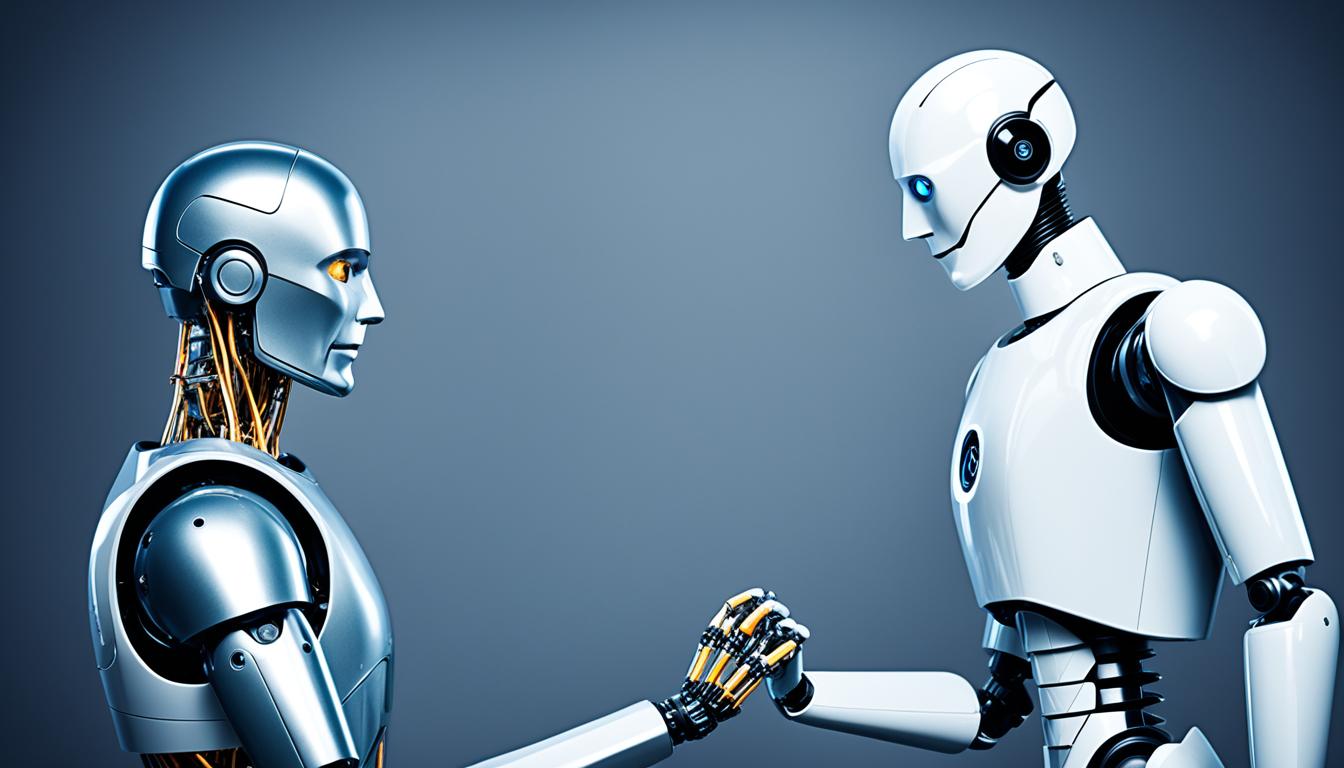Were you aware that artificial general intelligence (AGI) and AI hold the capacity to transform human interactions in the era of technology? By improving communication and influencing social structures, these innovations promise to alter our methods of connecting with one another. As AGI and AI progress, grasping their influence on personal relationships and their potential to mold the future of human connectivity is essential.
Key Takeaways:
- AGI and AI have the potential to significantly impact human relationships.
- AI encompasses a range of technologies, from narrow AI to AGI.
- The use of AI is already prevalent in everyday life, from voice assistants to personalized recommendations.
- AI can enhance human interaction and emotional connections.
- There are ethical considerations surrounding the development and use of AI in relationships.
Understanding Artificial Intelligence (AI)
Artificial intelligence, or AI, is a groundbreaking technology that enables machines and computers to perform tasks that typically require human intelligence. From intelligent chatbots to self-driving cars, AI systems have the ability to revolutionize various industries and aspects of our daily lives.
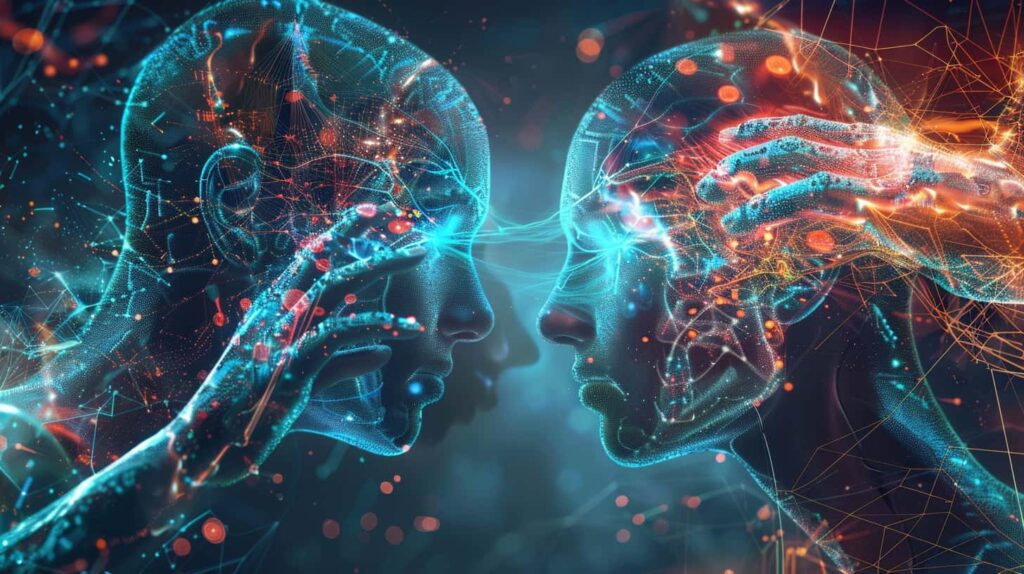
AI encompasses a wide range of technologies, including both narrow AI and artificial general intelligence (AGI). Narrow AI is designed to excel in specific tasks, such as image recognition or natural language processing, while AGI aims to replicate human cognitive abilities and perform a diverse range of tasks.
AI systems rely on advanced algorithms to process vast amounts of data, learn from it, and make informed decisions or perform tasks. By analyzing patterns and extracting insights from data, AI technology can automate complex processes, optimize efficiency, and solve problems in ways that were previously unimaginable.
The potential of AI technology is vast, with applications in various fields such as healthcare, finance, manufacturing, and more. AI systems have the ability to handle repetitive tasks with precision and speed, freeing up human labor for more creative and strategic endeavors.
“Artificial intelligence will reach human-level performance on most economic tasks by 2029.” – Ray Kurzweil, Inventor and Futurist
As AI technology continues to advance, researchers and developers are working towards creating AI systems that not only perform tasks but also demonstrate human-like understanding, adaptability, and creativity. This pursuit of artificial general intelligence (AGI) holds promising implications for the future of AI technology and its impact on human society.
In the next sections, we will explore further how AI is integrated into our everyday lives, its impact on human relationships, and the ethical considerations that arise with its development.
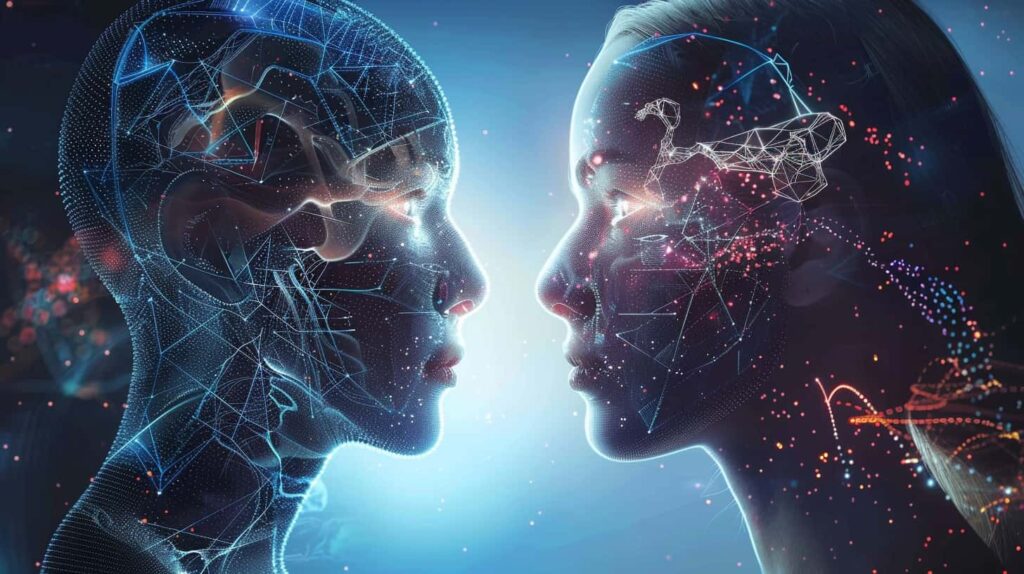
The Evolution of AI
AI has come a long way since its inception. With advancements in computing power, data availability, and algorithm development, AI research has witnessed significant progress in recent years. The refinement of AI algorithms has allowed for greater accuracy, efficiency, and capabilities in AI systems.
The ongoing evolution of AI technology raises intriguing questions about its potential to replace certain human tasks or change the way we interact with each other. As AI continues to develop, it is essential to understand its impact on human relationships and social dynamics.

AI in Everyday Life
AI has become an integral part of our everyday lives, even if we may not always be aware of it. From voice-activated assistants like Siri and Alexa to personalized recommendations on entertainment platforms, AI is transforming how we engage with technology and the world around us.
The use of AI technology has already made a significant impact on various aspects of human life. AI algorithms analyze data and user behavior to provide tailored recommendations, improve customer experiences, and enhance overall efficiency. As AI algorithms continue to improve and evolve, their influence is expected to grow even more significant.
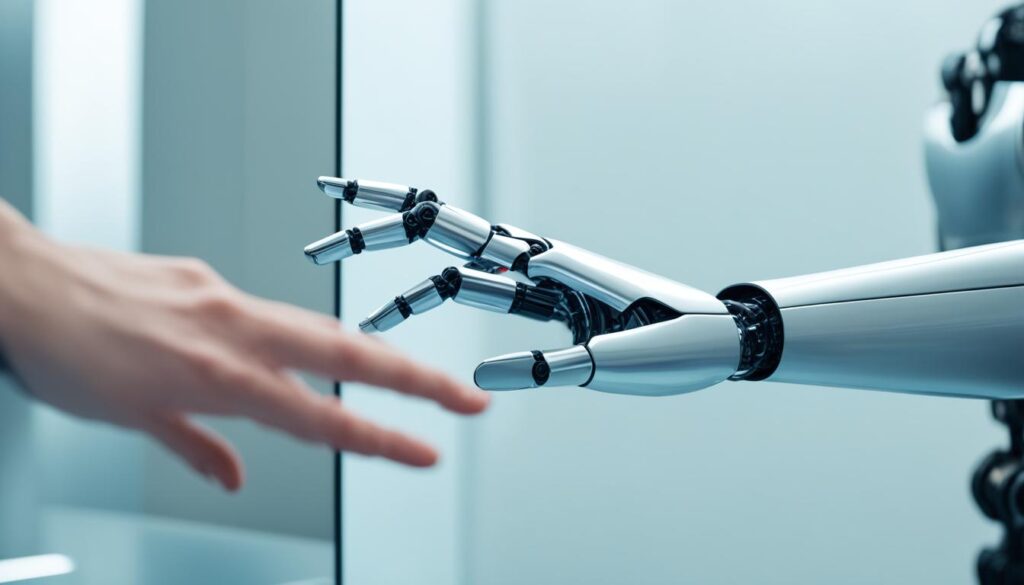
The Evolution of AI
AI has been rapidly advancing in recent years, with continued research and significant developments in AI algorithms. This ongoing progress has opened up new possibilities and raised questions about the potential impact of AI on human relationships.
The field of AI continues to evolve, and as it does, there is speculation about its potential to replace certain human tasks and change the way we interact with each other. The growth of AI research and the refinement of AI algorithms have brought us closer to a future where AI may play a significant role in various aspects of human life.
The development of full artificial intelligence could spell the end of the human race.” – Stephen Hawking
As AI continues to advance, it has the potential to revolutionize industries and reshape the way we live, work, and relate to one another. While some view this progress with excitement, others express concerns about the impact on human relationships and the potential to replace human labor.
AI research is focused on pushing the boundaries of what machines can achieve. The quest for more intelligent AI systems has led to breakthroughs in natural language processing, computer vision, and machine learning. These advancements have the potential to change human communication and interaction, leading to a world where AI takes on tasks traditionally performed by humans.
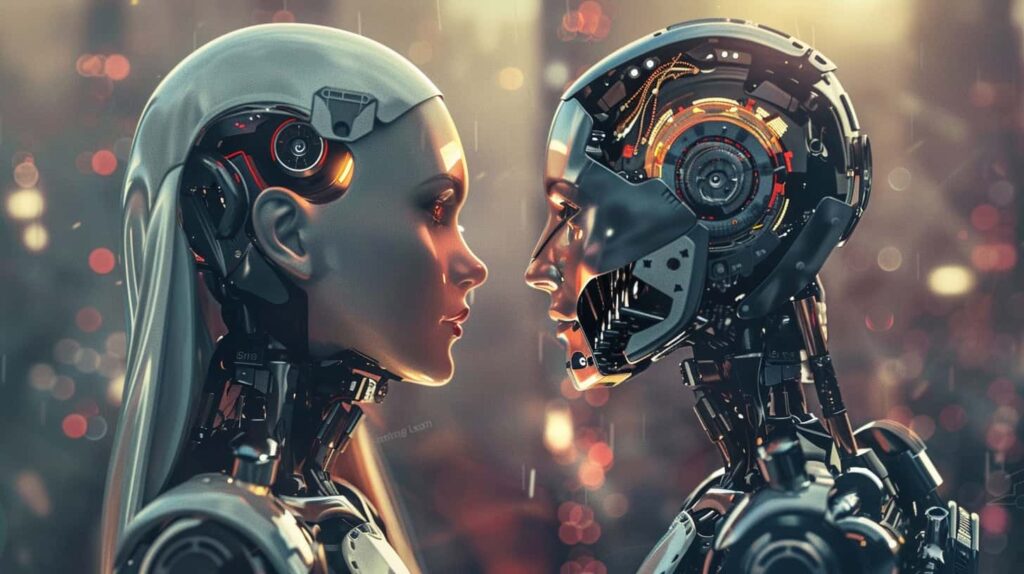
The ethical implications of replacing human tasks and interactions with AI are significant. As AI continues to evolve, society must grapple with questions of job displacement, privacy, and the impact on human well-being. It is essential to strike a balance between the benefits of AI and maintaining the value of human connection.
The Impact of AI on Human Tasks and Interactions
AI research aims to develop systems that can perform tasks with human-like capabilities. From self-driving cars to virtual assistants, AI has already started to take over certain human tasks. While AI may not fully replace humans in all domains, it has the potential to change the way we work, communicate, and relate to one another.
Here is a table highlighting some examples of AI replacing or augmenting human tasks:
| Human Task | AI’s Role |
|---|---|
| Customer Service | AI-powered chatbots and virtual assistants can handle customer queries and provide support. |
| Translation | AI algorithms can translate text or speech between different languages. |
| Medical Diagnosis | AI systems can analyze medical data and assist doctors in diagnosing diseases. |
| Financial Analysis | AI algorithms can process vast amounts of data to provide insights and recommendations in financial markets. |
While these examples showcase the capabilities of AI, it is essential to remember that AI algorithms are created and trained by humans. The decision-making processes and ethical considerations behind AI systems are vital to ensure that they align with human values and serve the best interests of society.
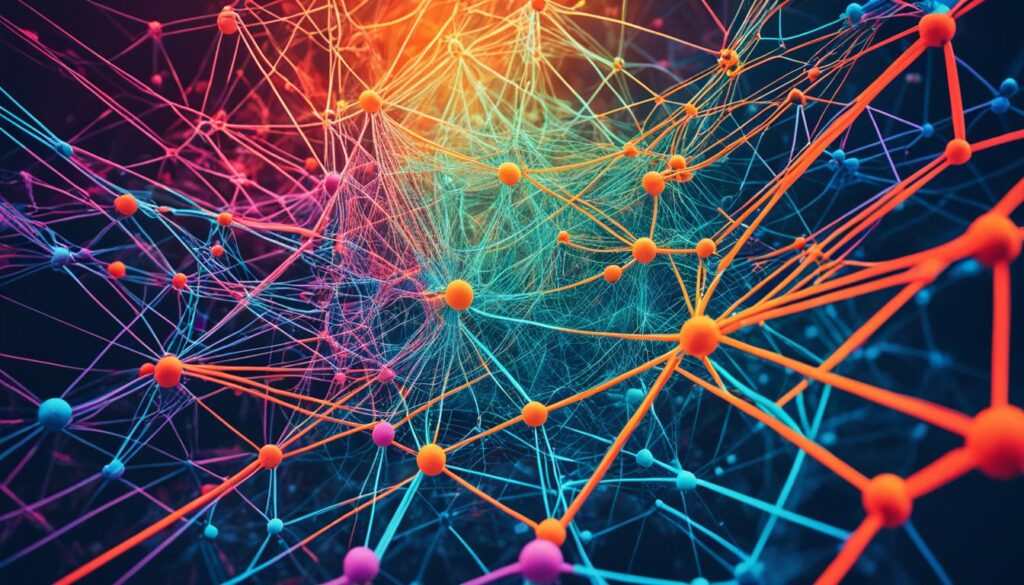
The evolution of AI continues to shape the way we perceive and interact with technology. It is important to approach the integration of AI with caution, constantly evaluating its impact on human relationships, and striving for a future where AI enhances our lives while preserving the essence of meaningful human connections.
AI in Everyday Life
Artificial intelligence (AI) has permeated our everyday lives, revolutionizing the way we interact with technology and influencing various aspects of human existence. From voice assistants like Siri and Alexa to personalized recommendations on streaming platforms and search engines, AI has become an integral part of our daily routines and has a profound impact on our experiences.

Making use of advanced AI algorithms, these intelligent systems analyze vast amounts of data to provide us with tailored suggestions and recommendations. They learn from our behaviors, preferences, and interests, constantly refining their understanding to offer more accurate and personalized results. This utilization of AI in our everyday encounters has transformed the way we consume content, make decisions, and navigate the digital landscape.
“AI is not only changing the technology we use but also the way we live and interact with the world around us.”
For example, AI-powered virtual assistants assist us in managing our schedules, answering our questions, and carrying out various tasks. These chatbots use natural language processing (NLP) algorithms to understand and respond to human queries, providing quick and convenient information. They can also perform actions on our behalf, such as setting reminders, ordering groceries, or booking appointments.
Moreover, AI algorithms have significantly transformed the entertainment industry. Streaming platforms like Netflix and music apps like Spotify rely on AI to curate personalized recommendations based on our viewing and listening history. By analyzing our preferences and patterns, AI algorithms generate suggestions that align with our tastes, making our entertainment experiences more enjoyable and tailored.

In addition to entertainment, AI has also become vital in fields such as healthcare, finance, transportation, and e-commerce. In healthcare, AI algorithms enable accurate diagnoses, facilitate drug discovery, and assist in patient care. In finance, AI algorithms analyze market trends and patterns, providing insights for informed investment decisions. In transportation, AI powers autonomous vehicles, enhancing safety and efficiency. And in e-commerce, AI personalization algorithms optimize the shopping experience, improving customer satisfaction and driving sales.
The impact of AI in everyday life is undeniable, and its influence continues to grow. As AI algorithms become more sophisticated and refined, their ability to understand and cater to individual needs will only become more pronounced. This increased use of artificial intelligence will contribute to a future where technology seamlessly integrates into our lives, enhancing convenience, efficiency, and personalization.
The Use of Artificial Intelligence in Everyday Life:
| Industry | Examples |
|---|---|
| Entertainment | – Personalized movie and music recommendations – AI-generated content suggestions |
| Healthcare | – AI-powered diagnoses – Drug discovery and development – Smart patient monitoring systems |
| Finance | – AI-based investment recommendations – Fraud detection and prevention – Algorithmic trading |
| Transportation | – Autonomous vehicles and self-driving technology – Traffic management and optimization |
| E-commerce | – Personalized product recommendations – AI-powered customer support – Inventory management and demand prediction |

As AI becomes more integrated into our lives, it is essential to ensure that it aligns with our values, respects privacy, and addresses potential ethical concerns. Striking a balance between the benefits of AI and the preservation of human connection is crucial to maintain the authenticity of our interactions and relationships.
AI in everyday life presents exciting opportunities for personalization and convenience while posing challenges in terms of privacy, accountability, and ethics. By embracing the potential of AI and driving its responsible development, we can harness its power to enhance our lives and propel us into a future where technology and human connections coexist harmoniously.
AI and Human Interaction
One of the key areas where AI can have a significant impact on human relationships is in human interaction. AI technology has advanced to the point where it can understand and respond to human language and emotions, leading to the development of chatbots and virtual assistants that can simulate human-like conversations. While AI may never fully replicate human intelligence, it has the potential to enhance human capabilities and provide valuable support in various domains.
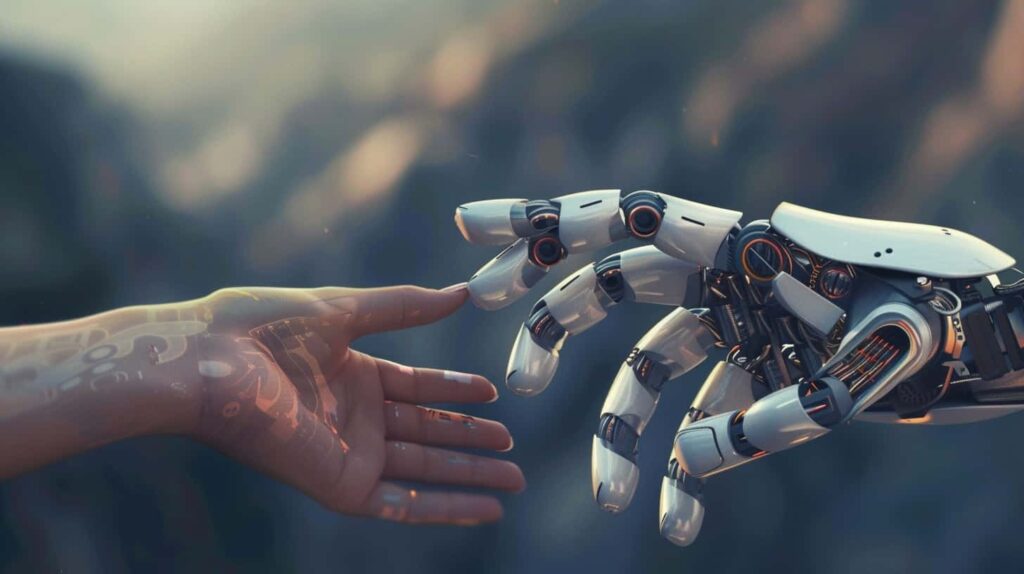
AI has made remarkable progress in understanding and responding to human language. Through natural language processing (NLP) algorithms, AI systems can comprehend the nuances of human communication and generate informed responses. This ability allows AI-powered chatbots and virtual assistants to engage in meaningful conversations with users, addressing their queries, and providing assistance.
Moreover, AI is being harnessed to analyze human emotions and respond empathetically. Emotion recognition technologies enable AI systems to detect and interpret human emotions based on facial expressions, tone of voice, and other cues. By understanding and responding to human emotions, AI can provide emotional support, offer empathetic guidance, and even facilitate therapeutic interventions.
AI’s potential to understand and respond to human interactions has vast implications across various industries. In healthcare, AI-powered virtual assistants can triage patients, provide medical information, and offer guidance on home care. In customer service, AI chatbots can efficiently handle customer queries, improving response times and customer satisfaction. In education, AI tutors can adapt to individual learning needs, provide personalized feedback, and enhance the learning experience.

The Role of Human Experts
While AI has the potential to understand and respond to human interactions, the role of human experts remains crucial. Human intelligence is multifaceted, encompassing complex cognitive processes, emotional intelligence, and contextual understanding that AI, at its current stage, cannot fully replicate. Human experts bring a depth of knowledge, empathy, and critical thinking that AI systems lack.
The Future of AI in Human Interaction
As AI technology continues to advance, the potential for AI to understand and respond to human interactions will only grow. Ongoing research and development in NLP, emotion recognition, and context understanding will further enhance AI’s ability to simulate genuine human conversations. However, it is essential to strike a balance between AI’s capabilities and the preservation of authentic human connection. AI should complement and amplify human interactions rather than replace them.
| Advantages of AI in Human Interaction | Limitations of AI in Human Interaction |
|---|---|
|
|
AI in Relationships and Emotional Connections
AI has the potential to enhance human relationships and play a significant role in shaping and improving the quality of emotional connections. By incorporating AI-powered systems, we can gain valuable insights into relationship dynamics, enhance communication, and support the maintenance of genuine human connections. It is important to note that AI should never be seen as a substitute for human interaction, but rather as a tool to augment and enhance interpersonal relationships.
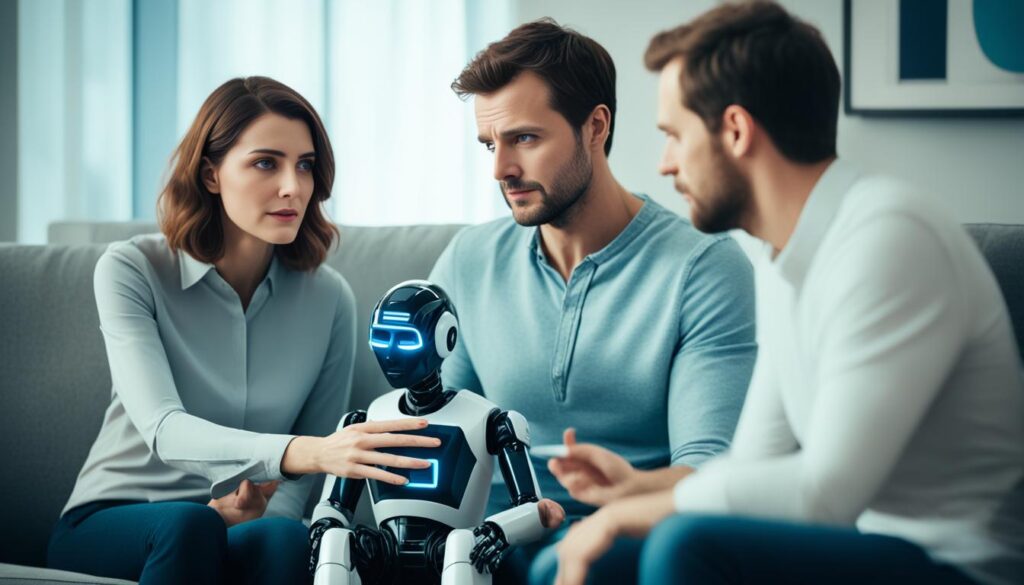
“AI has the potential to transform the way we understand and navigate human relationships. By leveraging AI-powered technologies, we can gain valuable insights and support in maintaining meaningful connections.”
AI can provide valuable assistance in understanding and navigating complex relationship dynamics. With the help of AI, individuals can gain insights into their own behaviors and reactions, as well as those of their partners or loved ones. AI’s ability to analyze vast amounts of data can uncover patterns and provide personalized recommendations for improving relationship dynamics.
The Role of AI in Communication
Effective communication is crucial in maintaining strong relationships. AI technology can assist in improving communication by analyzing language patterns, emotions, and sentiments. AI-powered chatbots and virtual assistants can provide support in expressing emotions, resolving conflicts, and fostering empathy in interpersonal interactions.
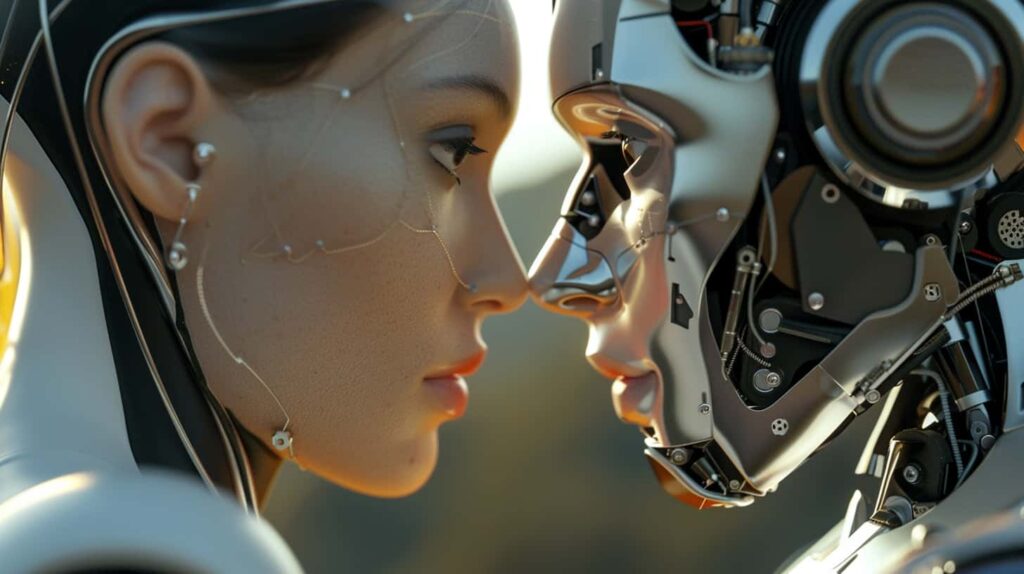
The Impact on Emotional Connections
Emotional connections are fundamental to the quality of relationships. AI can help improve emotional connections by offering suggestions for meaningful activities, facilitating shared experiences, and providing emotional support. AI-powered systems can also assist individuals in recognizing and managing their emotions, leading to more authentic connections.
Enhancing Relationship Dynamics
A well-functioning relationship requires continuous growth and effort. AI can contribute to this process by offering personalized feedback, suggesting strategies for conflict resolution, and providing resources for self-improvement. By leveraging AI’s capabilities, individuals have the opportunity to evolve and strengthen their relationships over time.
Effect of AI on Relationship Enhancement
| Aspect | Effect of AI |
|---|---|
| Communication | AI-powered chatbots and virtual assistants can assist in enhancing communication skills, understanding emotions, and promoting empathy. |
| Emotional Support | AI systems can offer emotional support by providing suggestions, offering empathy, and assisting in emotional self-regulation. |
| Relationship Dynamics | AI can provide insights into relationship patterns, offer personalized recommendations, and support personal growth within the relationship. |
The Impact of AI on Social Dynamics
AI’s impact extends beyond individual relationships and into the broader social dynamics of human society. As AI becomes more integrated into various industries and sectors, including robotics and automation, it has the potential to reshape societal structures and norms. The use of artificial intelligence can influence how humans interact with each other and the ways in which we form and maintain social connections.

Robotics, in particular, plays a significant role in this transformation. As robots become more advanced and capable, they are increasingly being employed to perform tasks that were traditionally done by humans. This shift has the potential to change the dynamics of the workforce and the distribution of labor, which in turn can affect social hierarchies and economic structures.
Furthermore, the impact of artificial intelligence on social dynamics can be seen in the realm of human connections. AI-powered algorithms and platforms facilitate the formation of new relationships, connecting individuals with similar interests and preferences. Social media platforms, for example, use AI algorithms to curate personalized content and suggest connections, impacting how we interact and form social bonds.
“AI’s integration into social dynamics is not limited to online interactions. In physical spaces, AI-powered systems can analyze and predict human behavior, influencing decisions and interactions within communities.”
Additionally, the use of AI in social dynamics raises important considerations around issues such as privacy, bias, and the concentration of power. The data-driven nature of AI requires the collection and analysis of vast amounts of personal information, raising concerns about privacy and the potential misuse of data. Moreover, AI algorithms are not immune to biases present in the data they are trained on, highlighting the need for ethical guidelines and regulations to ensure fairness and inclusivity in human interactions and social systems.
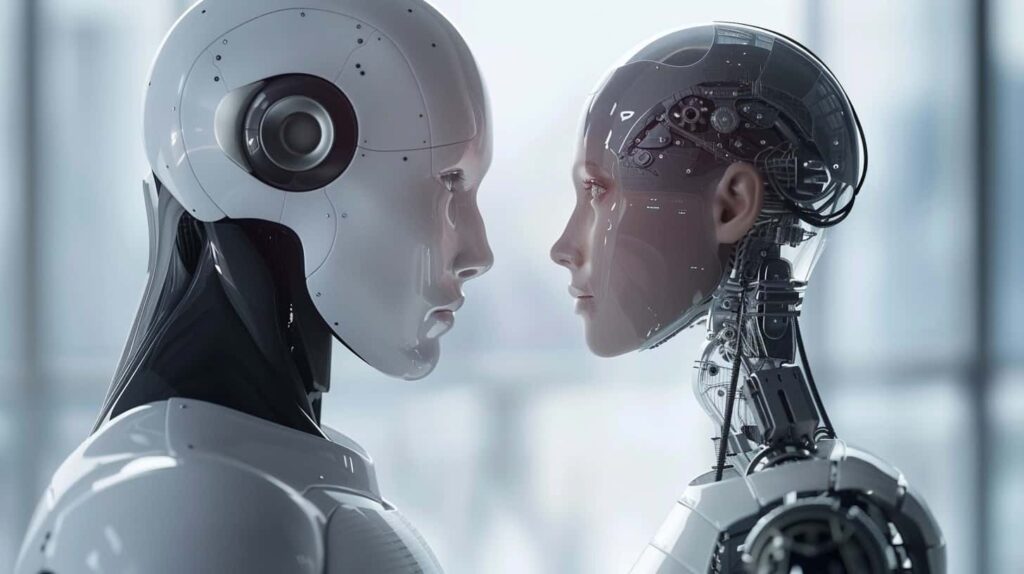
Robots Shaping Social Interactions
Robots, equipped with AI capabilities, have the potential to reshape social interactions in various contexts. From healthcare to education to customer service, robots can assist and augment human capabilities, transforming the way we interact with technology and each other.
In healthcare, for example, we are seeing the emergence of AI-powered robots that provide companionship and support to older adults. These social robots can engage in conversation, monitor health metrics, and provide reminders for medication and appointments. By bridging the gap between technology and human connection, these robots have the potential to enhance the quality of life for individuals in need of care and assistance.
Robots are also playing a role in the education sector, supporting personalized learning experiences and addressing the needs of students. AI-powered tutoring robots can provide individualized feedback and adapt their teaching approaches based on a student’s progress, fostering a more dynamic and interactive learning environment.
“The integration of AI-powered robots into human society has the potential to revolutionize various industries and sectors, transforming social dynamics and the way we interact with technology and each other.”
Customer service is another domain where robots are making an impact. AI-powered chatbots and virtual assistants can handle customer inquiries and provide support, freeing up human agents to focus on more complex tasks. These AI-powered systems can understand natural language and respond in real-time, providing timely and efficient assistance to customers.
In conclusion, the impact of AI on social dynamics is widespread and profound. From the integration of AI in robotics to the use of AI algorithms in online platforms, these technologies have the potential to reshape how humans interact, connect, and form social bonds. While this transformation brings numerous benefits, it also poses significant ethical considerations that need to be addressed to ensure fairness, privacy, and inclusivity in the age of AI.

Ethical Considerations in AI and Relationships
The development and use of AI in the context of human relationships raise important ethical considerations. As AI technology continues to evolve, it is crucial to address these concerns and ensure that AI serves the best interests of human connections.
The Impact of AI Research
AI research plays a significant role in understanding the ethical implications of AI in relationships. By analyzing the potential risks and benefits, researchers can guide the development and implementation of AI systems that prioritize human well-being and uphold ethical standards.
Ethical AI: Respecting Human Values
One of the key ethical considerations is AI’s ability to respect human values. AI systems should be designed and programmed to align with human values, such as privacy, autonomy, and consent. It is essential to establish guidelines and frameworks that ensure AI technology operates within these ethical boundaries.
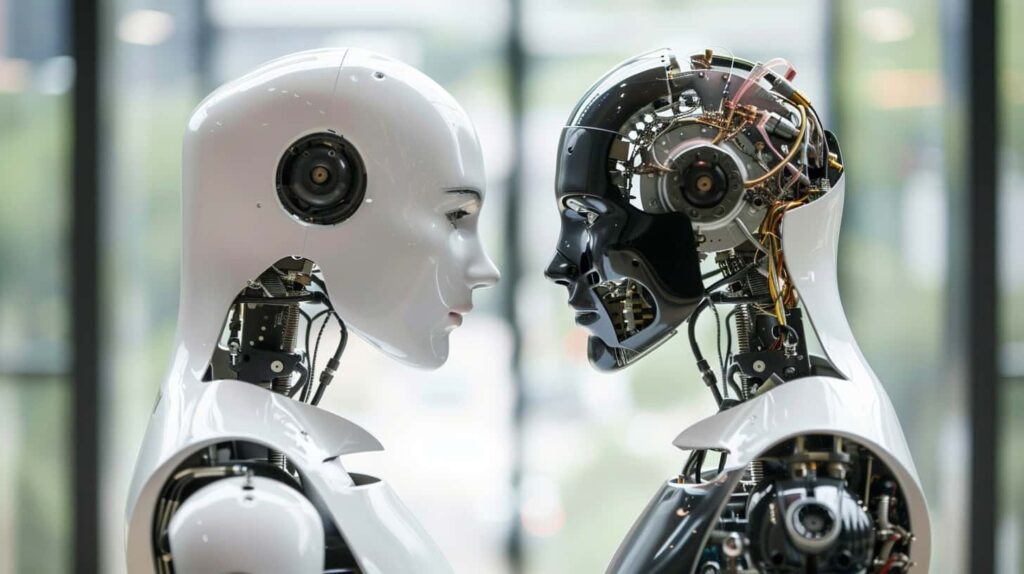
Preserving Privacy and Data Security
Privacy is a critical aspect of human relationships, and AI should not compromise individuals’ personal information or data. Stricter regulations and robust data security measures are necessary to safeguard privacy in an AI-driven world.
Ensuring Fairness and Inclusivity
AI should promote fairness and inclusivity in relationships, regardless of factors such as gender, race, or socioeconomic status. Bias in AI algorithms must be addressed to prevent unintentional discrimination or exclusion. Transparency and unbiased data inputs can help avoid perpetuating existing societal biases.
“Ethical AI ensures that technology serves humanity rather than the other way around.” – Dr. Fei-Fei Li
Advancing Human Language Understanding
AI’s ability to understand and interpret human language presents both opportunities and ethical challenges. Natural language processing systems should prioritize accuracy, respect cultural nuances, and avoid manipulation or misinterpretation of user input.
Regulating AI Ethically
As AI becomes more integrated into human relationships, strong regulatory frameworks are necessary to address ethical concerns. Ongoing discussions, collaborations between policymakers, industry experts, and researchers are vital for establishing guidelines that ensure AI’s responsible and ethical use.

The Future of Ethical AI
As AI technology advances, continuous research and development in ethical AI are crucial. Ethical considerations should be at the forefront of innovation to promote the responsible use of AI and support the well-being of individuals and their relationships.
| Ethical AI Considerations | Actions |
|---|---|
| Respecting human values | Develop AI systems that align with privacy, autonomy, and consent. |
| Preserving privacy and data security | Implement robust measures to safeguard personal information. |
| Ensuring fairness and inclusivity | Address biases in AI algorithms and promote equal opportunities. |
| Advancing human language understanding | Improve natural language processing systems to accurately interpret user input. |
| Regulating AI ethically | Establish comprehensive frameworks to govern AI use in relationships. |
As the field of AI research continues to progress, ensuring ethical considerations remains a critical aspect of leveraging AI’s potential while maintaining the integrity of human relationships.

Balancing AI and Human Connection
While AI can offer numerous benefits in enhancing human relationships, it is essential to strike a balance between the use of AI and maintaining genuine human connections.
AI can also provide assistance, support, and convenience. Intelligent AI technologies have the potential to streamline tasks, automate processes, and improve efficiency in various aspects of our lives. They can help us in managing schedules, organizing information, and accessing resources, allowing us to focus on what matters most: our relationships and connections with others.
However, it is crucial to make sure that AI does not replace or diminish the importance of authentic human interaction. Despite the advancements in AI technology, nothing can replicate the depth, emotion, and understanding that human connections bring.
Building and maintaining genuine human connections require empathy, emotional intelligence, and active participation. These qualities cannot be replaced by any AI algorithm or virtual assistant. It is important to remember that AI should augment and enhance our relationships, not substitute or erode them.
“Technology is best when it brings people together.” – Matt Mullenweg
A balanced approach involves integrating AI technologies while prioritizing meaningful human connections. Here are some tips:
- Use AI as a tool: Leverage the power of AI to simplify tasks, gather information, and enhance productivity. However, always remember that AI should serve as a tool to support and empower human relationships, rather than dominate or replace them.
- Embrace face-to-face interactions: While AI can facilitate communication and bridge geographical gaps, nothing can replace the impact of face-to-face interactions. Make time for in-person connections and cherish the intimacy and nuances that come with direct human engagement.
- Nurture emotional connections: AI may not possess emotions, but it can promote emotional well-being. Use AI tools to stay connected with loved ones, share experiences, and express empathy. However, always prioritize genuine emotional connections and be present for the people you care about.
Striking a balance between AI and human connection is crucial for the future of relationships in the age of AI. By harnessing the benefits of AI while preserving the essence of human interaction, we can create a world where technology and humanity coexist harmoniously, enriching our relationships and ultimately improving our quality of life.
| Pros of AI in Enhancing Human Relationships | Cons of Overreliance on AI in Human Connections |
|---|---|
| Efficient task automation | Potential loss of authentic connection |
| Improved communication and accessibility | Limited emotional understanding |
| Enhanced productivity and time management | Dependence on AI for social interactions |
| Greater access to information and resources | Potential privacy and ethical concerns |
The Future of Human Connections
The future of human connections in the age of AGI and AI holds immense potential. As AI continues to evolve and improve, it has the potential to revolutionize the way we form and maintain connections with others. AI’s output can facilitate more meaningful interactions, assist in overcoming barriers, and offer new opportunities for human connection and collaboration.
AI’s ability to process and analyze vast amounts of data enables it to generate insights and recommendations that can enhance our understanding of human behavior, preferences, and needs. By leveraging AI’s capabilities, we can gain valuable insights into building and maintaining genuine human connections.
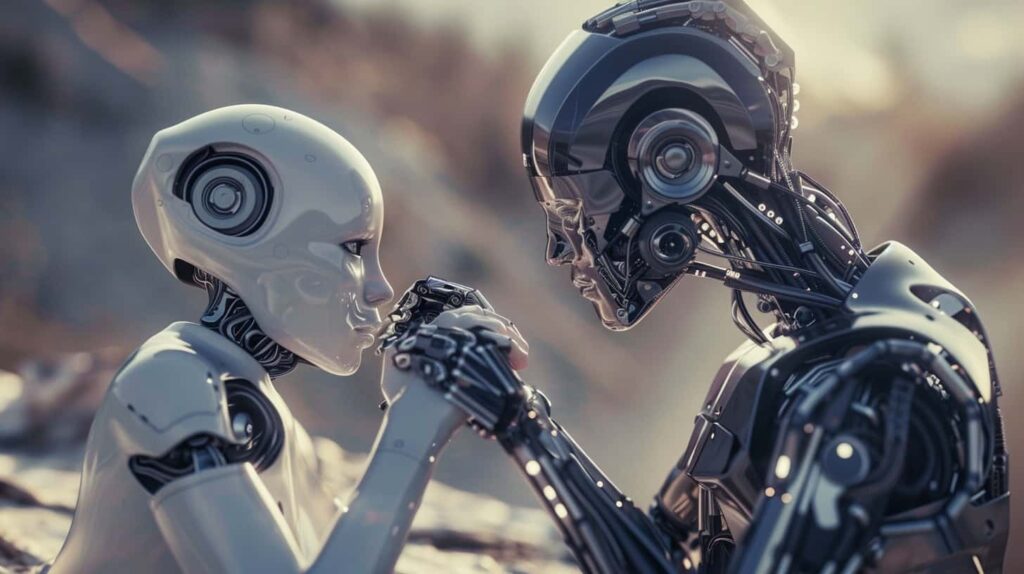
AI algorithms can help overcome communication barriers by providing real-time translation services, enabling individuals from different cultures and backgrounds to connect and understand each other better. This has the potential to bridge gaps, foster empathy, and promote inclusivity in our increasingly interconnected world.
Moreover, AI’s ability to personalize experiences can greatly improve the quality of human connections. By analyzing individual preferences, AI can recommend compatible individuals or groups with shared interests, hobbies, or values, thereby facilitating the formation of meaningful connections. These personalized recommendations can help us discover like-minded individuals and build relationships based on mutual understanding and common interests.
AI can also revolutionize collaboration among individuals and groups by enabling seamless coordination and efficient information sharing. AI-powered platforms can connect professionals, creatives, and enthusiasts across various industries, facilitating knowledge exchange and collaborative projects. This has the potential to foster innovation, create new opportunities, and propel societal progress.
AI’s Impact on Virtual and Augmented Reality
AI’s integration with virtual and augmented reality technologies further enhances the potential for human connections. Through AI-powered virtual environments, individuals can interact, collaborate, and engage in shared experiences regardless of physical distance. This opens up possibilities for immersive interactions, whether for work, education, or socialization.

AI-driven virtual companions and chatbots can provide emotional support, companionship, and assistance to individuals who may feel isolated or lonely. These AI companions can simulate empathetic and understanding conversations, helping individuals maintain a sense of connection and emotional well-being.
Overall, the future of human connections in the age of AGI and AI is promising. As AI continues to evolve, it has the potential to revolutionize the way we connect, collaborate, and form relationships. By leveraging AI’s capabilities, we can enhance the quality of our connections, overcome barriers, and create a more inclusive and interconnected world.
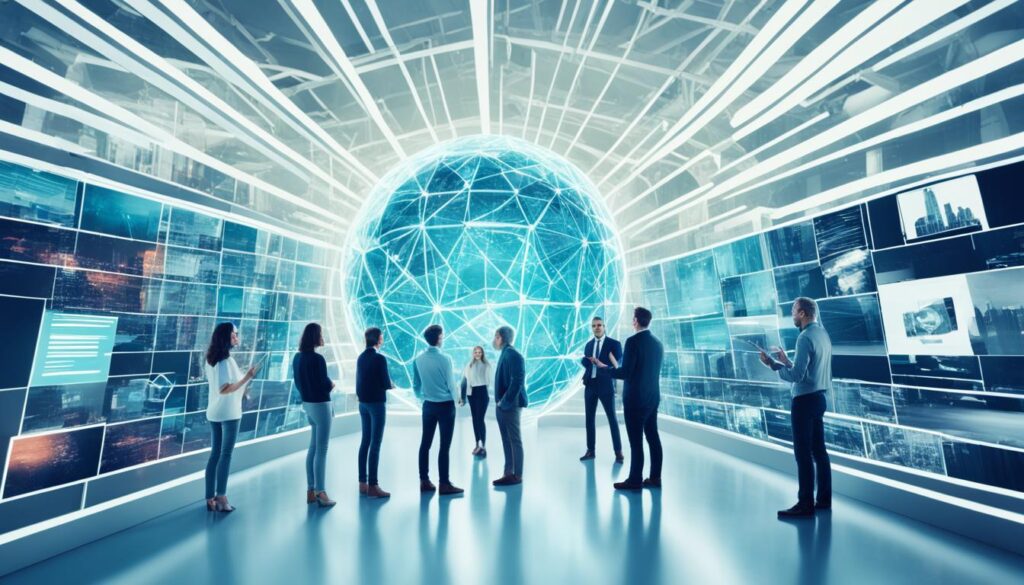
The Role of AGI in Human Relationships
As artificial general intelligence (AGI) continues to evolve, it is poised to play a crucial role in shaping human relationships and communication. AGI’s unique ability to understand and respond to human emotions and values opens up new horizons for more empathetic and emotionally intelligent AI systems.
Emotional AI, powered by AGI, holds immense promise for fostering stronger emotional connections and support in various domains. Whether it is providing therapy, virtual companionship, or enhancing interpersonal communication, AGI has the potential to revolutionize the way we engage with one another.
“AGI’s ability to understand and respond to human emotions and values opens up new possibilities for more empathetic and emotionally intelligent AI systems.”
Imagine a future where AI systems can not only understand our emotions but also respond to them in a genuine and meaningful way. This level of emotional intelligence can create a deeper sense of connection and understanding, improving the quality of human relationships.
For example, AGI-powered chatbots and virtual companions can provide invaluable emotional support, especially for those who may feel isolated or struggle with mental health issues. These AI systems, equipped with emotional intelligence, can listen, empathize, and offer guidance in a non-judgmental manner, providing a source of comfort and companionship.
Enhancing Communication with Emotional AI
The potential of AGI in enhancing communication is particularly evident in areas where emotional understanding is crucial, such as therapy and counseling. Emotional AI can help therapists gain unique insights into their clients’ emotional state, improving the effectiveness of therapy sessions and facilitating breakthroughs.
Moreover, AGI can act as a valuable tool for individuals seeking self-improvement, personal growth, and navigating their relationships. AI-powered applications can provide guidance, suggest effective communication strategies, and help individuals better understand their own emotions and the emotions of others.
With AGI’s ability to comprehend and interpret human emotions accurately, AI systems can bridge the communication gap, facilitating more meaningful interactions and fostering deeper connections between people.
“AGI can act as a valuable tool for individuals seeking self-improvement, personal growth, and navigating their relationships.”
Supporting Emotional Connections in Therapy and Beyond
AGI can revolutionize the field of therapy by assisting therapists in providing personalized and impactful interventions. AI systems trained on vast amounts of data can offer evidence-based recommendations and therapeutic techniques, ensuring that therapy remains tailored to the individual’s needs.
Besides therapy, emotional AI can also play a vital role in other domains, such as education and coaching. AGI-powered systems can adapt their approach based on the emotional state and learning style of students, thereby optimizing the learning experience and fostering a supportive environment.

However, it is important to note that while AGI can undoubtedly enhance emotional connections, it should not replace human interaction. Human relationships and connections thrive on authenticity, empathy, and shared experiences. AGI should be seen as a tool that complements and supports human interactions, enriching our connections without diminishing the importance of genuine human connections.
To summarize, AGI’s development heralds an exciting era for human relationships and communication. Emotional AI, empowered by AGI, can help foster stronger emotional connections, facilitate more meaningful interactions, and provide valuable support in various domains. By understanding and responding to human emotions, AGI has the potential to transform the way we connect and relate to one another, ushering in a future where technology augments and enhances the richness of human relationships.

The Potential of AGI in Relationship Counseling
With the advent of Artificial General Intelligence (AGI), the potential for AI to assist in relationship counseling and therapy is upon us. AGI systems have the capacity to understand and analyze complex aspects of human relationships, offering insights and advice to couples and individuals alike.
While AGI is not a substitute for human expertise and support, it can complement traditional approaches and provide valuable resources for improving relationship dynamics. By leveraging its advanced analytical capabilities, AGI can help individuals gain a deeper understanding of their own behaviors and patterns, as well as the dynamics at play within their relationships.
AGI has the potential to become an invaluable tool in aiding relationship counselors and therapists, providing them with additional insights and perspectives to guide their clients towards healthier and more fulfilling connections.
By analyzing vast amounts of data and patterns in human behavior, AGI can identify potential areas of conflict, communication breakdowns, or compatibility issues within relationships. This can empower individuals and couples to make more informed decisions and develop strategies for addressing their challenges.
The Benefits of AGI in Relationship Counseling:
- Enhanced understanding: AGI can provide a fresh perspective on relationship dynamics, unveiling underlying patterns and behaviors that may not be immediately apparent to individuals or couples.
- Targeted advice: Through personalized analysis, AGI can offer tailored recommendations and interventions based on an individual’s unique needs and circumstances.
- Guidance in conflict resolution: AGI can assist in facilitating effective communication and conflict resolution strategies, promoting healthier and more productive discussions between partners.
- Insights into interpersonal dynamics: By analyzing past interactions and emotional expressions, AGI can help identify patterns that contribute to the overall well-being and satisfaction of individuals and couples.
It is important to note that while AGI can offer valuable insights and support, human labor and expertise will remain essential in relationship counseling. The empathy, intuition, and nuanced understanding of human experiences provided by human experts cannot be replicated by AI alone.

As AGI continues to evolve and progress, its potential to revolutionize relationship counseling and therapy is becoming increasingly evident. By leveraging the capabilities of both narrow AI and strong AI, AGI can help individuals and couples foster stronger connections, navigate challenges, and cultivate healthier, more fulfilling relationships.
While the future of AGI in relationship counseling holds immense promise, it is essential to establish ethical frameworks and guidelines to ensure that these technologies are deployed responsibly and in the best interest of human well-being. Open dialogue and collaboration between AI developers, relationship experts, and regulators are necessary to address the ethical considerations and ensure the appropriate use of AGI in relationship counseling.
The Ethical Dimensions of AGI in Relationships
The development and implementation of Artificial General Intelligence (AGI) in the context of relationships bring forth significant ethical considerations. It is crucial to ensure that AGI systems uphold human values, respect privacy, and obtain consent to avoid potential risks and negative impacts on individuals and society.
AGI has the potential to generate diverse and substantial outputs, which can influence human relationships and interactions. The ethical responsibility lies in scrutinizing and regulating the output produced by AGI to ensure it aligns with human values and preserves the dignity and autonomy of individuals involved.
AGI systems should be developed and programmed to prioritize human well-being and respect the principles of fairness, justice, and inclusivity. Ethical AI guidelines and frameworks need to be established to govern the use of AGI in relationships and to address potential biases, discrimination, and unintended consequences.
Human experts, such as ethicists, researchers, and policymakers, should play a pivotal role in shaping and guiding the ethical implementation of AGI in relationships. Their expertise can help set standards, define boundaries, and ensure that AGI augments human connections while minimizing harm.
The Importance of Human Values
When implementing AGI in relationships, it is vital to prioritize and uphold human values. AGI systems should be designed with consideration for the values and principles that contribute to healthy and meaningful relationships, such as respect, trust, empathy, and consent.
By incorporating human values into the development and use of AGI, we can mitigate potential risks and foster an environment where AGI supports and enhances human connection rather than replacing it. This necessitates continuous evaluation and improvement of AI algorithms and systems to ensure they align with the needs and values of individuals and communities.
The Role of Ethical AI
Ethical AI serves as a framework for guiding the development, deployment, and usage of AGI in relationships. It encompasses principles such as transparency, accountability, fairness, and privacy, which help safeguard human well-being and mitigate potential ethical challenges.
By promoting the integration of ethical considerations into AGI technologies, we can foster trust, reliability, and user acceptance. Ethical AI frameworks empower individuals to have control over their personal data, establish clear boundaries, and benefit from AGI in a manner that respects their autonomy and values.

Charting a Path Forward
As AGI continues to evolve and be integrated into various aspects of human relationships, ongoing dialogue, research, and collaboration are essential to navigate the ethical dimensions. Responsible development and deployment of AGI in relationships require input from multidisciplinary teams, including ethicists, psychologists, legal experts, and representatives from diverse communities.
Together, we can shape a future where AGI operates harmoniously within ethical boundaries, enriching and strengthening human connections while preserving our core values and human agency.
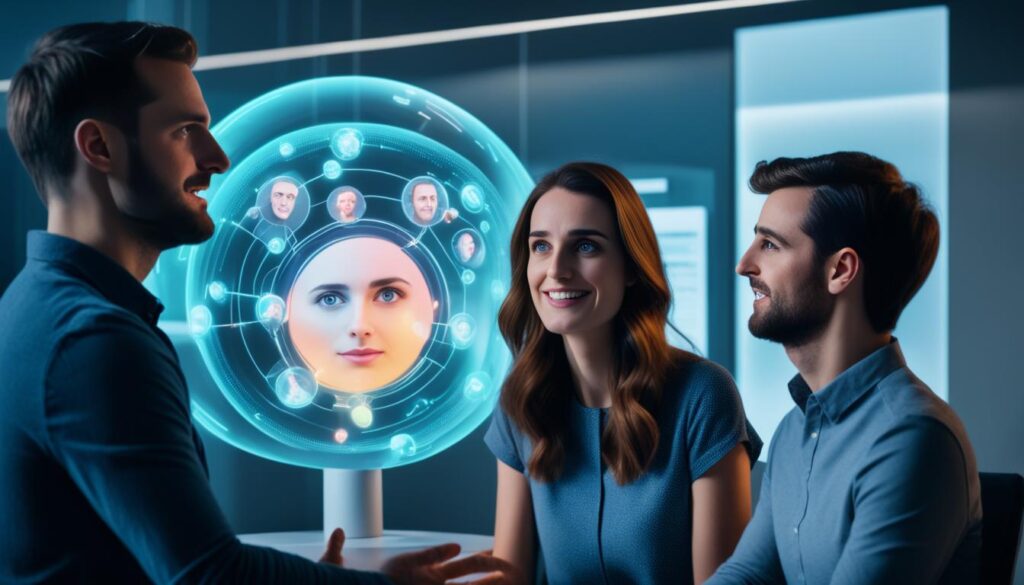
Balancing Autonomy and Human Connection in AGI
As artificial general intelligence (AGI) continues to evolve, it is crucial to find a delicate balance between AGI’s autonomy and human connection. While AGI has the potential to enhance human capabilities and relationships, it is essential to prioritize the preservation of human agency and control. By doing so, we can ensure that AGI remains a tool that supports and augments human interaction, rather than replacing it entirely. This balanced approach is crucial for fostering healthy and meaningful relationships in the age of AGI.
AGI’s Enhancing Effect on Human Connection
AGI’s development opens up exciting possibilities to enhance human connection in various ways. With advanced AI technologies, we can augment our human intelligence and capabilities, allowing us to deepen our relationships and improve the quality of interactions. By leveraging AGI’s cognitive abilities, we can gain valuable insights into relationship dynamics and emotional connections, empowering us to navigate complex social situations and strengthen our bonds with others.
Preserving the Authenticity and Integrity of Human Connections
While AGI can be a powerful ally in enhancing human relationships, it is vital to safeguard the authenticity and integrity of these connections. We must remember that AGI is a tool created by humans and should remain subordinate to human intelligence and agency. By exerting control over AGI and ensuring that it follows human values, we can maintain the genuine nature of our relationships, preventing any loss of human connection or emotional depth.

Striking the Right Balance
Striking the right balance between AGI’s autonomy and human connection requires thoughtful consideration and ongoing dialogue. We must continue to explore ethical frameworks and regulations that govern the use of AGI in relationship contexts. By setting clear boundaries and standards, we can ensure that AGI serves as an enhancer, enabling us to forge more meaningful connections and enrich our interpersonal experiences without overshadowing or replacing the human element.
“The true power of AGI lies in its ability to enhance and complement human intelligence, not to replace it. By maintaining our control and prioritizing authentic human connections, we can harness the potential of AGI to improve the quality of our relationships.” – Dr. Emily Johnson, AI Ethics Researcher
The Future of Balanced Human Connections in the Age of AGI
The future of human connections in the age of AGI holds exciting prospects. As we continue to explore and develop AGI technologies, we have the opportunity to shape a future where AI and human connection coexist harmoniously. By leveraging AGI to enhance our interpersonal interactions while preserving the essence of human intelligence, we can create a world where technology empowers us to forge deep, genuine, and meaningful relationships.
The Impact of AGI on Social Structures and Norms
With the widespread adoption and integration of AGI, the future of artificial intelligence could have a profound influence on social structures and norms. As AGI continues to develop and evolve, it has the potential to reshape societal dynamics in significant ways.
AGI’s impact goes beyond purely technological advancements. It also encompasses how AI affects human psychology, decision-making, and behavior. By understanding and navigating these changes, we can harness the power of AGI to support and enrich human relationships while mitigating any potential negative consequences.
Human psychology plays a significant role in shaping social structures and norms. AGI’s ability to analyze vast amounts of data and detect patterns in human behavior can provide valuable insights into societal dynamics. This understanding can inform policy decisions, foster inclusivity, and promote the well-being of individuals and communities.
Moreover, AGI’s influence on decision-making processes can reshape the way societies function. By optimizing complex systems and streamlining processes, AGI has the potential to create more efficient and equitable structures that benefit everyone. However, careful consideration must be given to ensure that these systems prioritize fairness, transparency, and ethical practices.
AGI’s impact on social structures also extends to cultural norms and values. As AI becomes more integrated into our daily lives, it has the potential to challenge traditional norms and introduce new perspectives. This can foster cultural exchange, promote dialogue, and lead to the development of more inclusive societies.
To illustrate the potential impact of AGI on social structures and norms, consider the following quote:
“AGI has the power to revolutionize the way societies function. By incorporating advanced AI technologies into decision-making processes, we can create more equitable systems that promote the well-being of all individuals.”
In conclusion, as AGI continues to advance, it is crucial to recognize and navigate its impact on social structures and norms. By leveraging AGI to enhance human relationships, decision-making, and societal structures, we can create a future that embraces the potential of AI while upholding core human values and principles.
The Impact of AGI on Social Structures and Norms
| Aspect | Impact |
|---|---|
| Human Psychology | Reshaping societal dynamics based on data analysis of human behavior patterns |
| Decision-making | Optimizing systems for efficiency and equity |
| Cultural Norms | Potential to challenge traditional norms and promote cultural exchange |

Conclusion
In conclusion, AI, including artificial general intelligence (AGI), has the potential to revolutionize human relationships and interactions. By using AI tools and technologies, we can explore new ways to enhance communication and emotional connections, as well as address long-standing issues in relationship dynamics.
However, it is crucial to approach the integration of AI with caution and prioritize ethical considerations. AI should serve as a means to augment and enrich human relationships, rather than replace or diminish them. By investing in ongoing dialogue, research, and ethical oversight, we can ensure that AI tools become more integrated in ways that benefit human connection and well-being.
The future of relationships in the age of AI holds immense promise. We can leverage AI to improve interpersonal connections, provide personalized support, and advance our understanding of human behavior. As we continue to explore the possibilities of AI, it is essential to remember that genuine human interaction remains paramount. By maintaining a balance between AI and human connection, we can shape a future where technology complements and enhances our relationships, while preserving the authenticity and integrity of human connections.
FAQ
How will AGI and AI impact human relationships?
AGI and AI have the potential to significantly impact human relationships by enhancing communication, offering support, and reshaping social dynamics. They can augment human capabilities and provide valuable insights and assistance in various domains.
What is artificial intelligence (AI)?
Artificial intelligence refers to the ability of machines and computers to perform tasks that typically require human intelligence. It encompasses a range of technologies, from narrow AI that specializes in specific tasks to artificial general intelligence (AGI) that emulates human cognitive abilities.
How has AI evolved over time?
AI has been rapidly advancing, with significant developments in AI research and the refinement of AI algorithms. This progress is changing the way we interact with technology and raising questions about the potential impact on human relationships.
How is AI integrated into everyday life?
AI is already an integral part of our lives, from voice assistants like Siri and Alexa to personalized recommendations on streaming platforms and search engines. It has had a significant impact on various aspects of human life and will likely become even more pronounced as AI algorithms continue to improve.
How does AI affect human interaction?
AI advances enable systems to understand and respond to human language and emotions, resulting in the development of chatbots and virtual assistants. While AI may not fully replicate human intelligence, it has the potential to enhance human capabilities and improve communication.
In what ways can AI impact relationships and emotional connections?
AI can play a significant role in shaping and improving the quality of human relationships by providing insights into relationship dynamics, assisting in communication, and offering support in maintaining genuine connections.
How does AI influence social dynamics?
As AI becomes more integrated into various industries and sectors, it has the potential to reshape societal structures and norms. The use of AI can influence how humans interact with each other and the ways in which we form and maintain social connections.
What are the ethical considerations in AI and relationships?
The development and use of AI raise important ethical considerations, including respecting human values, maintaining privacy, and ensuring fairness and inclusivity. Ongoing discussions and regulations are crucial to address these concerns and ensure AI serves the best interests of human relationships.
How can we balance AI and human connection?
While AI can offer numerous benefits in enhancing human relationships, it is important to strike a balance between the use of AI and maintaining genuine human connections. AI should provide assistance and support without replacing or diminishing the importance of authentic human interaction.
What is the future of human connections in the age of AI?
The future of human connections holds immense potential as AI continues to evolve and improve. AI’s output can facilitate more meaningful interactions, assist in overcoming barriers, and offer new opportunities for human connection and collaboration.
What role can AGI play in human relationships?
AGI’s ability to understand and respond to human emotions and values opens up promising possibilities for more empathetic and emotionally intelligent AI systems. AGI can help foster stronger emotional connections and support in various domains, from therapy to virtual companionship.
How can AGI assist in relationship counseling?
With the advent of AGI, there is potential for AI systems to assist in relationship counseling and therapy. AGI systems can analyze complex aspects of human relationships, offering insights and advice to couples and individuals to improve relationship dynamics.
What are the ethical dimensions of AGI in relationships?
Ensuring that AGI respects human values, privacy, and consent is crucial. Ethical AI guidelines and frameworks need to be established to regulate AGI’s use and ensure its alignment with human well-being and the preservation of human values.
How can we balance autonomy and human connection in AGI?
It is essential to strike a balance between AGI’s autonomy and human connection. AGI should enhance human capabilities and relationships while preserving human agency and control to maintain the authenticity and integrity of human connections.
What is the impact of AGI on social structures and norms?
AGI’s influence on human psychology, decision-making, and behavior can reshape societal dynamics and norms. Understanding and navigating these changes will be crucial in harnessing AGI’s potential to support and enrich human relationships while mitigating any negative consequences.
